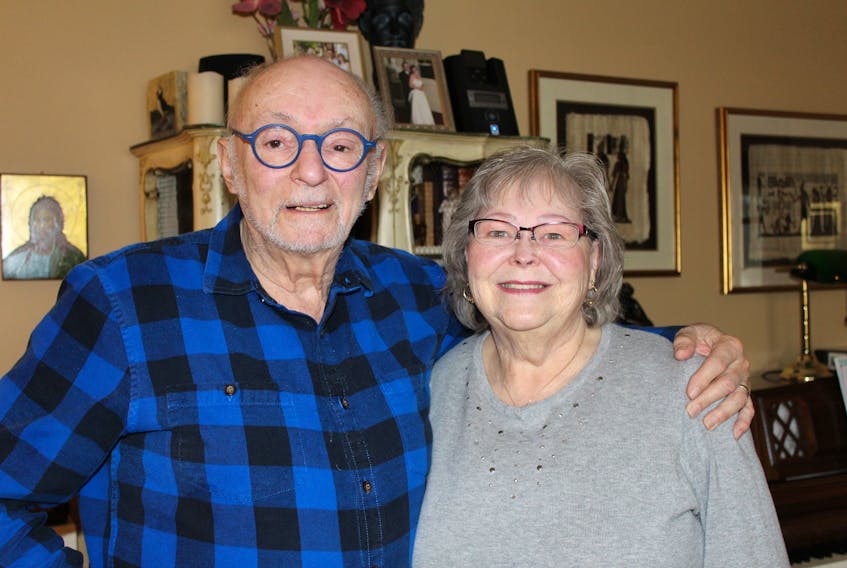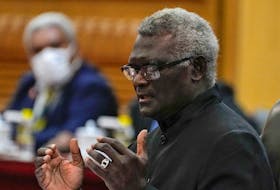Editor’s note: The one thing we all have in common is that we’re getting older by the day, and as we age, our priorities and lifestyles change.
In time, many of us will have to deal with similar issues — staying independent and active, maintaining a social life, getting involved (or staying involved) in volunteer work and community advocacy, finding the right housing fit for our lifestyles, and making the transition to retirement.
In this six-part series, The Telegram’s Ashley Fitzpatrick talks to people about what they’ve learned from their own experiences.
There’s no going back, but it can also be hard at times to move forward.

Avrum and Eve Richler, husband and wife, are life partners who married a year to the day they met. They make a point of helping each other through the more challenging times. One example they both acknowledge freely is Avrum’s retirement.
“Having worked for 70 years at something I loved and suddenly I woke up in the morning, I had no place to work. … That’s hard.” — Dr. Avrum Richler
He’s a fan of 11th and 12th-century Persian poet and astronomer Omar Khayyam, and talking about retirement in a recent interview, Avrum quoted from memory the English translation of “The Rubaiyat.”
“The moving finger writes; and, having writ, moves on,” he said.
“In other words, whatever you’ve done, it’s done. You can’t change it. You can’t go back.”
An optometrist, he found it difficult to leave his daily work behind; it was personally hard to accept. He knows he’s not the only one to feel that way.
“I’ve met many people who are retired. Some of them retired early. ‘Are you happy?’ And they always say, ‘Oh yeah, great, great, great!’ I don’t believe it,” he said, his wife looking over.
“Having worked for 70 years at something I loved and suddenly I woke up in the morning, I had no place to work. … That’s hard,” he said.
He enjoys golf, he said, but half-jokes that there’s only so much golf to play. And while he had ideas of things he’d like to do, the transition was the trick. It took him awhile.
“He felt lost,” said Eve, who retired several years ago herself after a career in business administration.
But they talked about it throughout the process.
Janine Hubbard, past-president and now communications director for the Association of Psychology Newfoundland and Labrador, said Avrum’s experience is a common one. If you’re currently pre-retirement, she said, consider thinking ahead and preparing psychologically in the same way you’re suggested to prepare financially. That might include thinking about your identity outside of work, deciding if you might want to continue to work — albeit in a different role, and putting some extra energy into strengthening friendships you have outside of work.
Hubbard recommends seriously considering how you will spend your time day to day.
“It’s starting to look and figure out ‘What are the extracurricular activities that I’m going to enjoy long-term?’” she said. “Try stuff out. Don’t just assume that you’re going to retire and then start joining the clubs… the teams, the bridge clubs, the book clubs, whatever it might be. You might find that you hate those if you’ve never done them before.”
And don’t be afraid to reach out, she said. That goes for if you’re feeling anxious about the idea of retirement, or are already retired and not comfortable.
“I started writing,” Avrum said. He eased into it, as they say.
“(Now) I want to finish my book. And I want to write another book and I want to start playing my mandolin again and I want to paint. I don’t know if I’m going to have time to do all that, but I’m trying.”
“Because the dollar loses value, everything goes up in price and once your income ceases to be what it was, it’s a big adjustment for everybody.” — Eve Richler
Apart from thinking about daily activity — and being prepared not to necessarily be jubilant on day one — the Richlers also strongly recommend planning ahead financially as soon as you can.
“Because the dollar loses value, everything goes up in price and once your income ceases to be what it was, it’s a big adjustment for everybody,” Eve said.
“And even though you may have savings and RRSPs and the other things you try to accumulate when you’re earning, it’s never really enough for what you think.”
Eve felt challenged during her time as a caregiver to her mother-in-law, and then to her own mother, while continuing to work.
She said finances are a popular topic of conversation for them and their friends — selling, adjusting, changing, moving.
The couple — she’s 70, he’ll be 93 in a couple of weeks — are packing up and preparing to downsize, and there are emotional moments, moments they work through.
Eve said there are plenty of positives about the coming move. Less space means less space to clean, for one thing. And they’re not planning to have big dinner parties at their new place, already planning for alternatives like dining out and hosting smaller gatherings with friends.
There is data that speaks to the financial and health benefits of not heading solo into retirement, but in 2018 the U.K.’s Centre for Ageing Better also published the results of a poll of more than 6,000 people 50 and over, showing a “mainly or generally positive” attitude towards aging was more likely for couples.
“Worsening health is a bigger worry for people living on their own — 80 per cent of separated people compared with 69 per cent of married people,” the non-profit stated.
The Richlers have been a resource for each other. And they say their relationship hasn’t really changed over the years.
“We’ve been married now for 29 years and we still kiss goodnight, we still kiss when one of us leaves the house, ‘Drive safely!’ And you can still find us walking along wherever, holding hands,” Eve said.
“One hand has a cane,” Avrum interjects.
“Yes, one hand has a cane. My husband walks with a cane,” Eve said. “But not a lot has changed for us in terms of how we respond to each other and the love we feel for each other.”
Related stories
GETTING OLDER: Staying in the game
GETTING OLDER: The drive for independence
Related link








